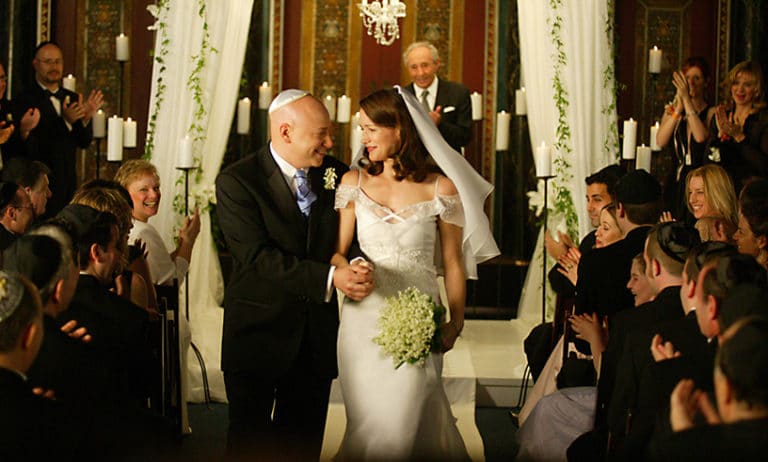
It’s been over 20 years since the world was introduced to Carrie, Charlotte, Miranda and Samantha: New York City’s most fabulous friend group. Now, the gals are back (although without Samantha) in a spinoff called “And Just Like That,” premiering on December 9th.
In honor of the new show (and as a fan of the original), I got to reflecting on the impact of Sex and the City.
At the time, Sex and the City was groundbreaking. The series aired from 1998 until 2004 and was known as the pinnacle guide to all things dating, friendship and New York city. While it remains one of the most iconic female-centered comedy-dramas of all time, even die-hard fans can admit that aspects of the show (which was considered wildly progressive at the time) did not age well.
Like when Miranda tries getting Carrie to leave her apartment post-breakup by showing up at her door and proclaiming:
“Get your coat on, Anne Frank, we’re going out.”
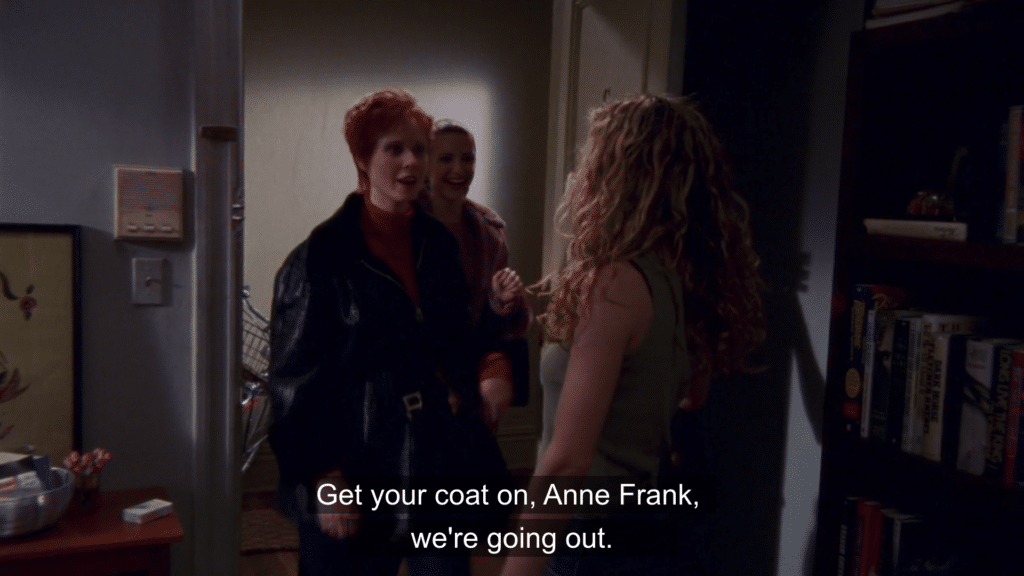
When it comes to the show’s lack of diversity, the Jewish contingent is no exception. Nearly every portrayal of Jews and Judaism is riddled with stereotypes. (And we’re definitely not the first to notice.)
The most obvious example? Harry Goldenblatt.
In season six, lawyer Harry Goldenblatt makes his on-screen debut when he storms into a sensitive meeting in search of a bagel.
He grabs a bagel from the tray, schmears it with cream cheese, and shoves it into his mouth. Then, he quickly spits it back into his hand, realizing it was blueberry, and announces that he will be lodging a complaint about the bagel.
I’ve said it before and I’ll say it again, there’s no need for Harry to be that Jewish on Sex and the City. As a Jewish adult I’ve never been that big of a stereotype.
— SouthJerseyScoop (@alex_goldman26) November 23, 2021
The show proceeds to focus on Harry’s uncontrollable schvitzing, back hair, and the fact that Charlotte finds herself drawn to Harry, despite feeling ashamed to be seen with him.
“I couldn’t help but wonder…why would a progressive show about cosmopolitanism depict Jewish characters as hairy, socially-impaired moneybags with big genitals and bigger sweat glands?,” writes The Forward’s Jenny Singer.
Once Charlotte is in Harry’s life we see the Jewish narrative mature slightly. The way she embraces Jewish traditions is in many ways lovely to watch. Yet the Jewish stereotypes persist: we hear of women gossiping at synagogue, Jewish mother’s trying to find eligible nice Jewish girls for their sons, and fighting over spots in line at the deli.
Don’t get me wrong, we’re Jews, we know how to laugh at ourselves. But let’s not forget that the Jewish narrative in Sex and the City (and its more problematic scenes) started long before Harry.
For starters, it’s worth mentioning that Sex and the City undeniably feels Jewish.
“Technically, sex and the city is Jewish canon,” one Twitter user joked.
As it happens, I’m not the only one who wondered why couldn’t Carrie Bradshaw have been Jewish? She fits the bill in every way.
Technically sex and the city is Jewish canon
— cloudbursting daddy 🌫 (@KurtInterrupted) November 29, 2021
That’s why Sex and the City’s treatment of Jews and Judaism is particularly disappointing.
In fact, I re-watched Sex and the City from start to finish in hopes of writing an article on the show’s ‘best Jewish moments’ (aside from those iconic ones after Charlotte’s conversion). Despite my best efforts, nearly all I could find were moments that made me cringe.
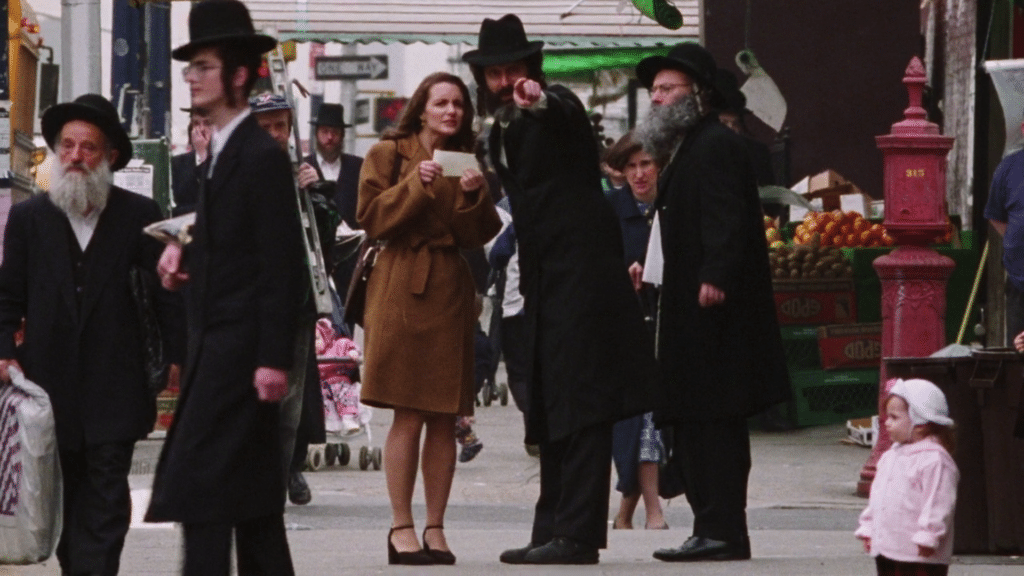
For example, in the very first season of the show, Charlotte has another love affair with a Jewish man. This time, a “Hasidic folk artist from Brooklyn,” she clarifies, when Carrie asks to hear about her relationship with “the Rabbi.”
Yiddish folk music plays over a scene of Charlotte being intimate with “Shmuel” as Carrie narrates: “Charlotte quickly became intoxicated by his talent, strangeness and the smell of his wool.”
i love Charlotte York cuz shes the only character in history who fetishized jewish men
— eli (@MonicaJewinsky) April 12, 2020
“We would talk about art, and sex, and the Torah,” Charlotte tells Carrie. And when asked why she never introduced her boyfriend to her friends, Charlotte coyly answers, “I was embarrassed.”
Quite frankly, the scene borders on antisemitic at worst and offensive at best.
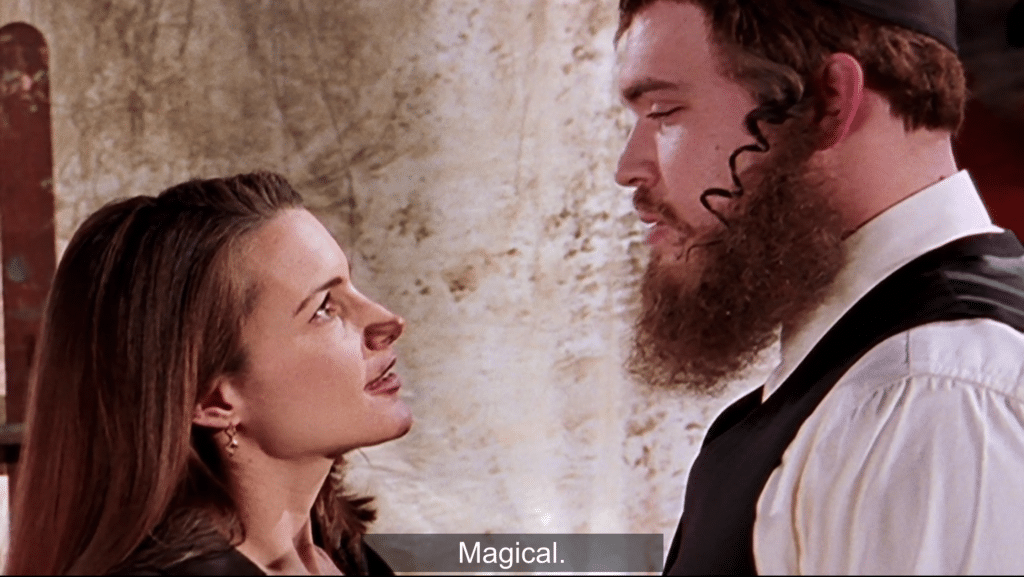
Then, there was the time Charlotte brought a man home to her apartment.
“Look at the size of this place,” he exclaims, walking around Charlotte’s large New York City apartment.
“Wow, you’re rich,” he continues. “My ex-wife was an Orthodox Jew and now you’re a rich girl.”
To be fair, Charlotte kicked him out immediately, but what was accomplished by writing more antisemitic trope-like comments into the script?
Lastly, of course, are those clever passing comments like Miranda’s “Get your coat on, Anne Frank, we’re going out” that I mentioned earlier.
In another scene, Samantha uses a hotdog as a prop to describe one of her sexual encounters and Carrie responds with, “Is it Kosher?”
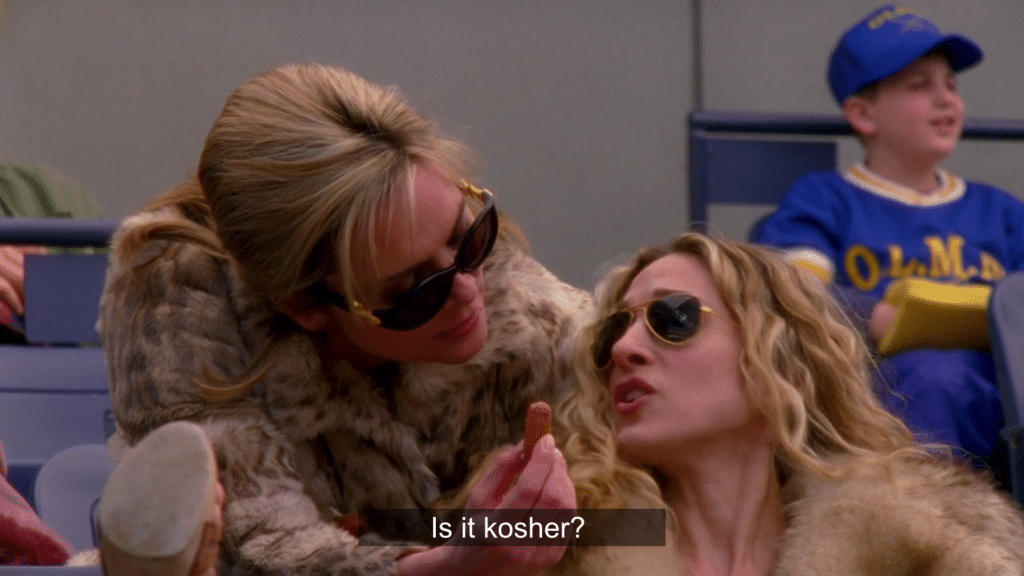
It’s a joke (and a funny one at that), but something about the characters using Jewish humor, despite not being Jewish, and then proceeding to promote stereotypes and antisemitic tropes, feels very off.
On the other hand, the most notable Jewish story arch in Sex and the City is Charlotte’s conversion to Judaism. Which, I must acknowledge, had many Jewish pride moments.
Thank you to Charlotte York for helping me pronounce a few of the Jewish blessings. #HappyHanukkah
— Erin Topeff (@topessss) December 14, 2017
In fact, some people have cited Charlotte’s conversion process as one of the more authentic and affirming Jewish conversions on screen.
But for a show that is set in one of the most Jewish cities in the world, you’d think Sex and the City could do better than that.
Especially, because the show is chock-full of Jews on and off screen. Among them: Sarah Jessica Parker (her dad is Jewish), Kristen Davis (Charlotte), Evan Handler (Harry), and Willie Garson, who passed away earlier this year and played Carrie’s iconic best friend, Stanford Blatch.
The show’s creator and executive producer, Darren Star, is also Jewish.
So why couldn’t they get it together?
Looking back, some of the cast members recognized issues with the show’s lack of representation.
“The incredible lack of diversity was the Achilles’ heel of the show, the first time around,” Cynthia Nixon told Vogue.
After announcing the spinoff, HBO Max chief content officer Casey Bloys told TVLine that the spinoff would focus on diversifying Carrie, Charlotte and Miranda’s friend group.
“[They] didn’t want to tell a story with all-white writers or an all-white cast,” he said. ”It’s not reflective of New York. So they are being very, very conscious about understanding that New York has to reflect the way New York looks today.”
Black actors Nicole Ari Parker and Karen Pittman joined the cast in addition to Sara Ramírez, who is Mexican American and nonbinary, and Sarita Choudhury, who is of English and Bengali-Indian descent.
“In no way were we interested in tokenism,” Sarah Jessica Parker told Vogue in an interview. “You can’t bring people on the show and not let the camera be with them! These characters are all gifts to us.”
Now, I’m just curious to see if these promises of representation will also extend to the show’s Jewish narrative and characters.
Will you be watching? Let us know on Instagram, Twitter, and TikTok!
Originally Published Dec 9, 2021 12:03AM EST
